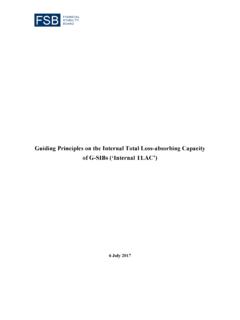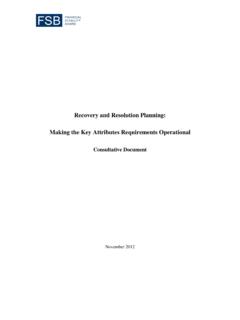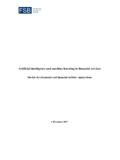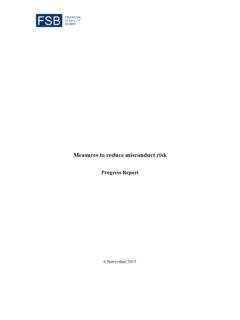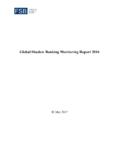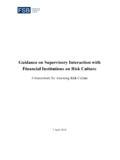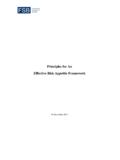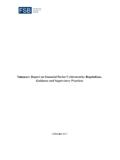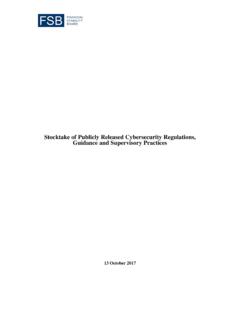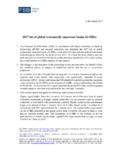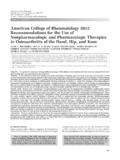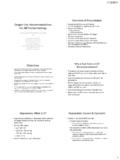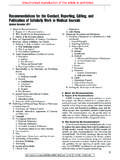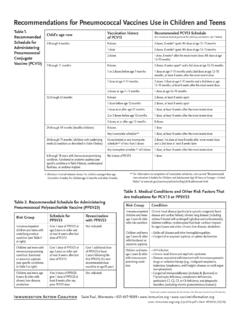Transcription of Recommendations for consistent national reporting of data ...
1 Recommendations for consistent national reporting of data on the use of compensation tools to address misconduct risk Consultative Document 7 May 2018 The Financial Stability Board (FSB) is established to coordinate at the international level the work of national financial authorities and international standard-setting bodies in order to develop and promote the implementation of effective regulatory, supervisory and other financial sector policies. Its mandate is set out in the FSB Charter, which governs the policymaking and related activities of the FSB. These activities, including any decisions reached in their context, shall not be binding or give rise to any legal rights or obligations under the FSB s Articles of Association. Contacting the Financial Stability Board Sign up for e-mail alerts: Follow the FSB on Twitter: @FinStbBoard E-mail the FSB at: Copyright 2018 Financial Stability Board.
2 Please refer to: iii The Financial Stability Board (FSB) is seeking comments on its consultative document on Recommendations for consistent national reporting1 of data on the use of compensation tools to address misconduct The FSB agreed a workplan in May 2015 to address misconduct risk through a combination of measures, focusing on (i) examining whether reforms to incentives, for instance to governance and compensation structures, are having sufficient effect on reducing misconduct risk and whether additional measures are needed; (ii) examining whether steps are needed to improve global standards of conduct in the fixed income, commodities and currency (FICC) markets; and (iii) coordinating reforms to major financial The work comprises measures for effective governance and compensation frameworks.
3 In the area of compensation, in particular,4 the FSB issued Supplementary Guidance to the FSB Principles and Standards on Sound Compensation Practices ( Supplementary Guidance to P&S ) regarding the use of compensation tools to address misconduct risk in significant financial institutions ( financial institutions that national supervisory authorities consider significant for the purposes of the P&S).5 The FSB work on addressing misconduct risk also supports efforts to improve supervisory consideration of compensation practices. In this vein, this document represents the view of the FSB on Recommendations ( Recommendations ) for consistent reporting of data to national (or jurisdictional)6 supervisory authorities, within the scope of applicable legislative and regulatory frameworks, on the use of compensation tools to address 1 Use of the term reporting in this document refers broadly to supervisory information flows (or to information made available by firms to the supervisors) in the context of supervisory dialogue with firms and not to public disclosure requirements.
4 The data gathered by national supervisory authorities would remain with them and would be considered in established processes for monitoring the use of compensation tools. 2 For the purposes of this document, misconduct is defined as conduct that falls short of expected standards, including legal, professional, internal conduct and ethical standards (please see also footnote 9). 3 The most recent FSB progress report on the misconduct workplan was published in July 2017 ( ). 4 See FSF Principles for Sound Compensation Practices, April 2009 ( P&S ) and FSB Principles for Sound Compensation Practices - Implementation standards, September 2009 ( Implementation Standards for P&S ) ( ). FSB, Supplementary Guidance to the FSB Principles and Standards on Sound Compensation Practices, 2018 ( /).
5 The guidance does not establish additional principles or standards beyond those already set out in the P&S. The guidance has been developed in the form of Recommendations on better practices at financial institutions considered significant for the purposes of the P&S. 5 The P&S also note that The FSF Principles for Sound Compensation Practices are intended to apply to significant financial institutions, but they are especially critical for large, systemically important firms . 6 Throughout the document the terms regulator, supervisor, supervisory authority, national supervisory authority and jurisdictional supervisory authority, in singular or plural, are used interchangeably, and therefore they should be understood as referring to the competent authority, as the context may require. This would apply in cases where the competent authority is not the national authority, for example in the case of the European Central Bank that, in cooperation with national competent authorities (NCAs), through the Single Supervisory Mechanism (SSM), is responsible for supervising Significant Institutions established in the participating EU Member States, as defined by Articles 4 and 6 (4) of the SSM Regulation of the European Central Bank (ECB); while Less Significant Institutions are under the direct supervision of the NCAs and the ECB is responsible for exercising oversight over the functioning of the system.
6 Iv misconduct risk in significant financial institutions. Currently, the gathering and analysis of compensation data vary significantly across jurisdictions and firms. Similarly, in terms of the information available to national supervisory authorities, a variety of approaches exists. Firms and supervisors have expressed interest in further development of data gathering and data analysis and reporting The draft Recommendations for consultation are directed to the relevant national supervisory authorities for firms in all financial sectors. They build on existing international efforts and national supervisory work, and, in particular for the banking sector, take into consideration the Basel Committee on Banking Supervision (BCBS) Pillar 3 disclosures framework, which includes disclosures on The consultation seeks input from various stakeholders in order to benefit from the collective perspective, experience and range of practice currently employed.
7 The FSB invites comments on the consultative document and the following specific questions: 1. Is the proposed Data Set sufficient to help (a) supervisors and (b) firms to monitor the effectiveness of the use of compensation tools to address misconduct? 2. If not, which additional data/information should be collected? 3. Are there any impediments to (a) firms and (b) supervisors in (i) gathering or (ii) using the Data Set? 4. Are there any elements in the Data Set that may not be relevant to a particular financial sector? 5. Are there any additional elements that should instead be considered for a particular financial sector? 6. What elements of the Data Set are not already utilised by firms in their own monitoring of compensation and misconduct risk management practices? 7. What types of information have been most useful to firms in their monitoring and assessments of potential misconduct, and when assessing the effectiveness of compensation tools?
8 7 Several jurisdictions collect information routinely as part of the supervisory process, covering for example, risk-taking, risk outcomes, compensation structures, use of compensation tools and misconduct. Other jurisdictions gather information only on an ad hoc basis, if at all. In addition, in some jurisdictions there are substantial public disclosure requirements related to compensation. Pillar 3 standards from the BCBS cover information on the use of compensation tools. At the firm level, data gathering processes differ across individual firms, financial sectors and jurisdictions. Whereas some firms have developed sophisticated monitoring and reporting mechanisms, other firms are only at the beginning of this process. (See FSB, Stocktake of efforts to strengthen governance frameworks to mitigate misconduct risks, May 2017 ( ).)
9 8 See BCBS, Pillar 3 disclosure requirements (part 13), March 2017 ( ). The requirements provide for banks and banking organisations to disclose qualitative and quantitative information on their remuneration policies. Quantitative disclosure templates are meant to provide information on a bank s fixed and variable remuneration awarded during the financial year, details of any special payments made, and information on a bank s total outstanding deferred and retained remuneration, respectively. The disclosure requirements should be published annually, with the first disclosures due in a bank s Pillar 3 report at its financial year-end 2017. v 8. What are the most important changes that have occurred in firms management of compensation and conduct risk in recent years?
10 Do the current Recommendations focus enough on these developments that may help to better achieve alignment of risk and reward? 9. How do firms monitor and validate the use of compensation tools when misconduct occurs to ensure an appropriate balance between risk and reward? What analytics support firms judgments in these areas? Responses to this consultative document should be sent to by Friday 6 July 2018. Responses will be published on the FSB s website unless respondents expressly request otherwise. vi Contents Page 1. Introduction .. 1 2. Misconduct and Compensation .. 2 3. Objectives of the Recommendations .. 4 4. Scope .. 6 5. Recommendations .. 6 1 Recommendations for consistent national reporting of data on the use of compensation tools to address misconduct risk 1.
